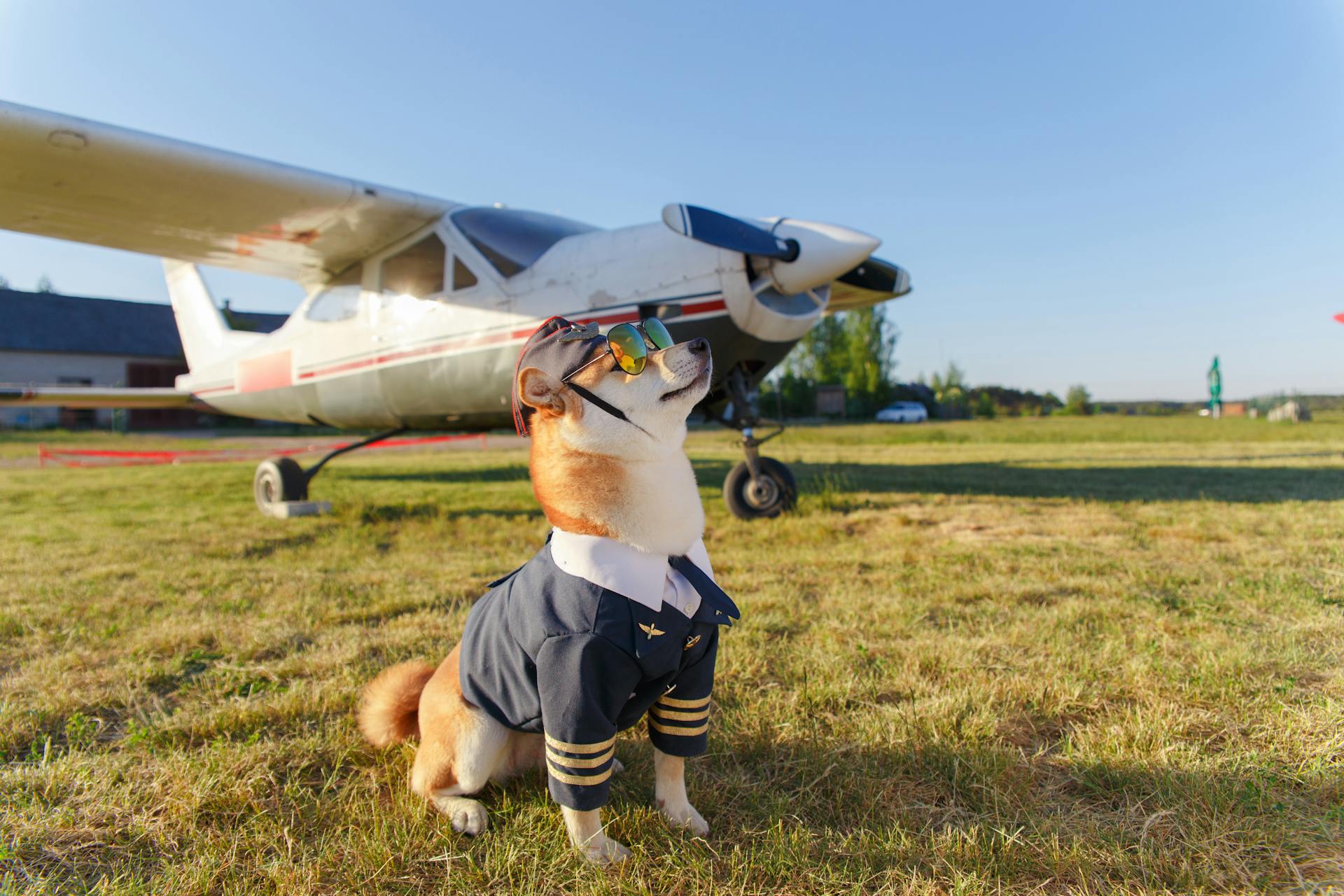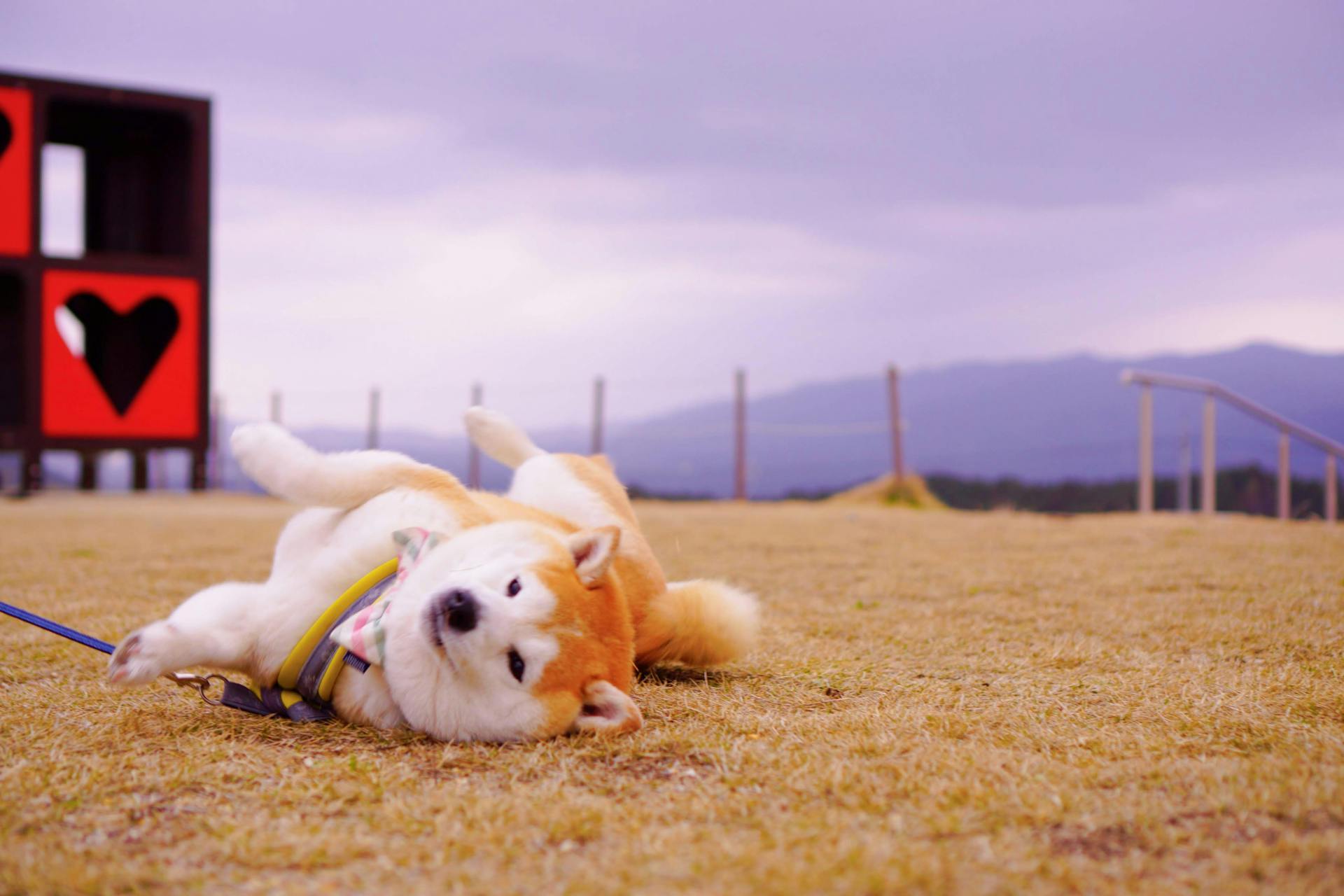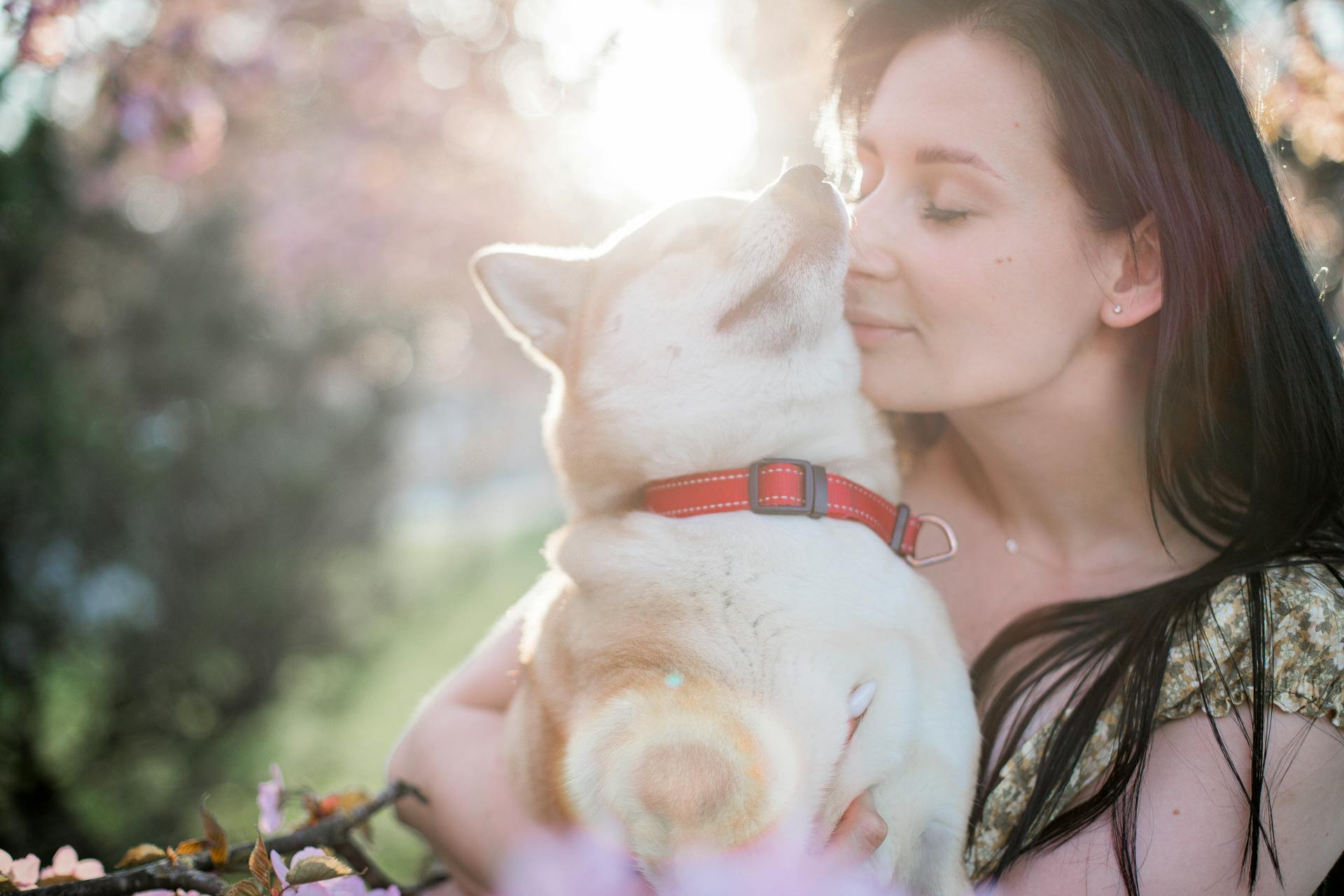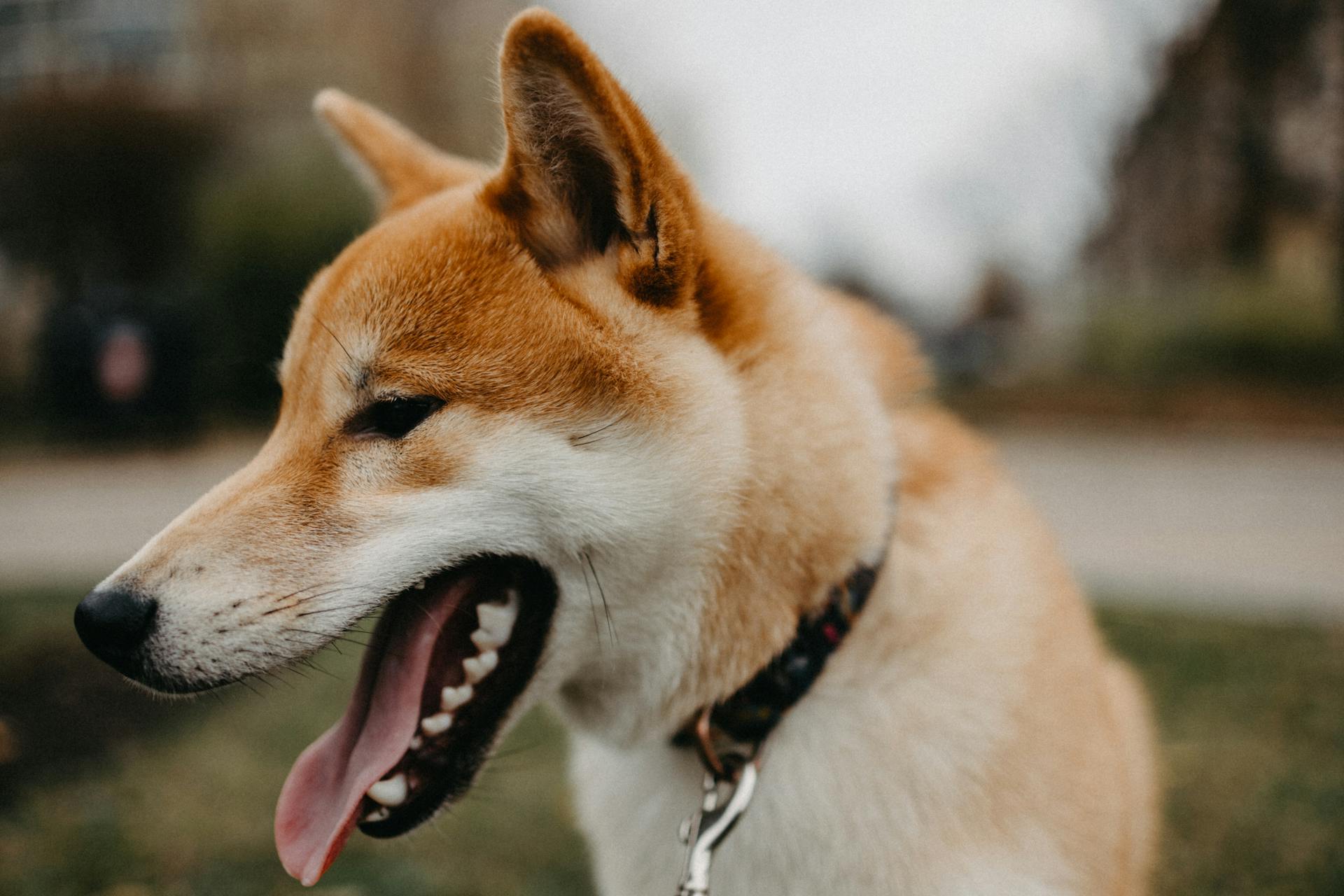
Shiba Inus are known for their unique appearance, with a fox-like face and curved tail. Their distinctive features include a short, straight muzzle and erect ears.
These dogs are relatively small in size, weighing between 15-25 pounds and standing 13-17 inches tall. Their thick double coat sheds heavily, requiring regular grooming.
Shiba Inus are an independent breed, known for being strong-willed and stubborn at times. They can be wary of strangers and may require time to warm up to new people.
With proper training and socialization, Shiba Inus can make loyal and loving companions for experienced dog owners.
Care and Upkeep
Shiba Inus need a daily workout, either in the form of active games, long walks, or off-leash runs in a securely fenced area.
The breed prefers cooler weather but can deal with warmer temperatures. Shibas also benefit from mental challenges of games and agility work.
A Shiba's top coat is stiff and stands off from the body, and it should be brushed occasionally. The undercoat is extremely dense and sheds profusely twice a year.
Daily brushing is needed during shedding season, and a hair dryer or dog-appropriate vacuum can be used to remove dead hair from the coat.
Shiba Inus are generally quite healthy, but perhaps the most prevalent ailment is allergies. Some Shibas also suffer from patellar luxation, a dislocation of the kneecap.
Dogs that hop with a rear leg held up and forward should be checked by a veterinarian.
Temperament
The Shiba Inu temperament is a unique blend of confidence, loyalty, and independence. They are known to be alert, lively, and good-natured, but can also be quite stubborn and strong-willed.
A Shiba Inu's strong prey drive and hunting instinct means they can be a challenge to handle, especially when it comes to wildlife. They need to be kept on a lead in such situations to prevent them from chasing after small animals.
Shibas are generally good with their owners, forming strong bonds and being loving companions, but they can be aloof towards strangers and may challenge unfamiliar dogs. Early socialization is crucial to ensure they grow into well-rounded dogs.
Some key characteristics of the Shiba Inu temperament include:
- Inquisitive and playful
- Good-natured and loyal
- Stubborn and strong-willed
- Strong prey drive and hunting instinct
Personality
The Shiba Inu personality is a unique blend of confidence, loyalty, and independence. They can form strong bonds with their owners, but may be aloof towards strangers.
Shibas are known to be inquisitive, playful, and good-natured, making them a joy to be around. However, they can also be quite stubborn and independent, which can make training a challenge.
A well-bred Shiba Inu is good-natured, alert, and bold, but may have a strong prey drive and hunting instinct. This means they're best kept on a lead, especially when in the presence of wildlife.
Shiba Inus can be quite vocal, with a tendency to yodel when they want attention and make a high-pitched scream when excited. They're not big barkers, but their unique forms of communication can be entertaining.
To ensure a Shiba Inu grows into a well-rounded dog, early socialization is crucial. Exposing them to many different people, sights, sounds, and experiences will help them develop good social skills.
Here are some key personality traits to consider when bringing a Shiba Inu into your family:
- Inquisitive and playful
- Good-natured, but can be stubborn and independent
- Strong prey drive and hunting instinct
- Can be vocal, with unique forms of communication
- Requires early socialization to develop good social skills
Behavior with Other Pets
The Shiba Inu's temperament is quite unique when it comes to interacting with other pets. They can get along with children who treat them kindly, but it's essential to teach kids how to approach and touch dogs gently.
You should always supervise interactions between dogs and young children to prevent any biting or ear or tail pulling. It's also crucial to teach children not to approach any dog while it's eating or sleeping, or to try to take its food away.
Early training and socialization can help the Shiba Inu get along with other dogs, but it's not a guarantee. They can be aggressive toward other dogs and may chase animals they perceive as prey.
Training and keeping them on a leash are the best ways to manage the Shiba Inu with other dogs and animals.
You might like: How to Train a Shiba Inu
Training and Exercise
Training and exercise are crucial for Shiba Inus, and I'm excited to share some key facts with you.
Shiba Inus are relatively easy to train, but their strong-willed nature can make it challenging at times. They tend to lose focus and test the boundaries of what they can get away with.
To avoid boredom and destructive behavior, Shiba Inus need plenty of mental stimulation. This can be achieved with toys, games, and activities that challenge their minds.
A Shiba Inu's energetic personality requires at least 40-60 minutes of exercise every day. This should include off-lead activity in a safe, enclosed area to prevent escape attempts.
Shibas love problem-solving games that bring out their cunning side, and food motivation is a great way to engage them. Hiding food treats around the garden is a fun way to encourage their natural hunting instinct.
A lively and attentive personality makes for a great ball game partner, and including ball games in your training can help improve recall training without boring them.
Here's a rough guide to the daily exercise needs of Shiba Inus:
In the summer months, a garden water hose can be a great source of fun for Shiba Inus, and it'll help keep them cool too!
Health
Shiba Inus are known to be generally healthy dogs, but like all breeds, they can be prone to certain health issues. Some Shiba Inus may develop hip dysplasia, a condition that can lead to arthritis and mobility problems.
Their small size also makes them susceptible to hypoglycemia, a condition that occurs when their blood sugar levels drop too low.
Shiba Inus require regular exercise to stay healthy, but their short coats mean they don't need to be bathed frequently.
Their independent nature can sometimes make training challenging, but consistency and positive reinforcement can help.
What to Know Before Buying or Rehoming a Pet
Shiba Inus are known for forming a strong bond with their owners, who love being part of everything that goes on around the home.
However, Shibas are notoriously independent and have a stubborn nature, making them best suited to experienced owners and families with older children.
Regular exercise is essential, with 40-60 minutes recommended each day to keep them happy and engaged.
Explore further: Shiba Inu Owners
Mental stimulation is also crucial to avoid boredom, so be prepared to provide plenty of opportunities for play and learning.
These expert escape artists will test your boundaries, so it's essential to establish an alpha role early in your relationship and make sure any gardens are fully secure.
A thick, double coat that sheds throughout the year means regular grooming and cleaning up excess hair around the home is a must.
Be fussy about the breeder you choose, as 'Lucy's Law' dictates that new puppies must be bought directly from a breeder or adopted from rescue, with third-party sellers being illegal.
Here are some key things to consider before bringing a Shiba Inu into your home:
- Loyal and loving, yet independent and stubborn
- Requires 40-60 minutes of exercise per day
- Needs mental stimulation to avoid boredom
- Requires regular grooming and cleaning
- Must be bought directly from a breeder or adopted from rescue
Quick Facts
The Shiba Inu is a small dog with a big personality. They typically stand 14-16 inches tall and weigh 23-27 pounds.
Their coat is thick and double-layered, coming in red, sesame, or black and tan colors.
Shiba Inus have a lifespan of 12-15 years, which is a good thing considering how much love and companionship they bring to our lives.
Some potential health concerns to be aware of include hip dysplasia, elbow dysplasia, and eye problems.
To keep your Shiba Inu happy and healthy, they need daily exercise, but they're also content with short daily walks.
Regular brushing is a must to remove dead hair and prevent mats from forming.
Their name, "Shiba Inu", literally means "brushwood dog" in Japanese.
Here are some key stats to keep in mind:
- Origin: Japan
- Size: 14-16 inches tall, 23-27 pounds
- Coat: Thick, double coat
- Lifespan: 12-15 years
- Health concerns: Hip dysplasia, elbow dysplasia, eye problems
- Activity level: Moderate
- Grooming: Regular brushing
Highlights
Shiba Inus are known for their agility and hunting instincts, making them quick and agile hunters. They were originally bred for this purpose.
Their name, "Shiba Inu", translates to "brushwood dog", possibly referring to their hunting terrain or the color of their coat.
Shibas have become internet sensations, with the "Doge" meme being one of the most famous examples. This meme features a Shiba with comic sans captions.
If this caught your attention, see: Shiba Dog Meme
Shibas are often compared to cats due to their grooming habits and independence. They tend to keep themselves very clean and are particular about their surroundings.
The "Shiba scream" is a unique vocalization of the breed, often heard when they are excited or not getting their way. It can be startling to hear.
Shibas are notorious escape artists, so owners need to ensure their living spaces are secure. This is a common challenge many Shiba owners face.
A Shiba Inu's lifespan can range from 12 to 15 years, allowing for many years of companionship.
History
The Shiba Inu has a rich history that spans centuries.
The breed originated in Japan, where it was used as a hunting dog to flush out small game and birds for hunters.
The Shiba Inu was one of six breeds to emerge from Japan, all larger than it.
The breed's name is thought to refer to the brushwood bushes in which they hunted, or the fiery red color of their coats.
Take a look at this: Shiba Inu Price Japan
The Shiba Inu's population was severely reduced during World War II, with many dogs perishing in bombing raids or succumbing to distemper.
After the war, breeding programs were established to preserve the breed, and the Japanese Kennel Club was founded in 1948.
The first Shiba Inu was imported to the United States in 1954, but it wasn't until the 1970s that the breed gained popularity.
The Shiba Inu was recognized by the American Kennel Club in 1993, and it gained full status with the Non-Sporting Group in 1997.
You might like: Pit Bull Terrier Ukc
Size
Shiba Inus are a relatively small breed, with males standing 14.5 to 16.5 inches tall.
Their height is just one aspect of their overall size, as they also vary in weight. Males typically weigh around 23 pounds.
Females are slightly smaller, standing 13.5 to 15.5 inches tall.
Nutrition
Your Shiba Inu's nutrition plan is crucial for maintaining a healthy weight. They're small but active dogs, so choose good quality food in the right sized portions.
All dogs love mealtimes, but Shibas are particularly food motivated. To avoid overfeeding, measure out your pet's food carefully.
A balanced diet of good quality, dry dog food is essential. This should contain all the necessary minerals and proteins for your Shiba's optimal health.
Recommended daily feeding amounts vary depending on your Shiba's size, age, build, metabolism, and activity level. A highly active dog will need more food than a couch potato dog.
Here's a rough guide to daily feeding amounts: 1/2 to 1.5 cups of high-quality dry food daily, divided into two meals.
To ensure your Shiba stays in good shape, measure his food and feed him twice a day. Avoid leaving food out all the time.
You can check if your Shiba is overweight by looking down at him - you should see a waist. Then, place your hands on his back, thumbs along the spine, and fingers spread downward. If you can't feel his ribs without pressing hard, he needs less food and more exercise.
You might enjoy: Can Shiba Inu Reach 1 Cent in 2030
Featured Images: pexels.com


